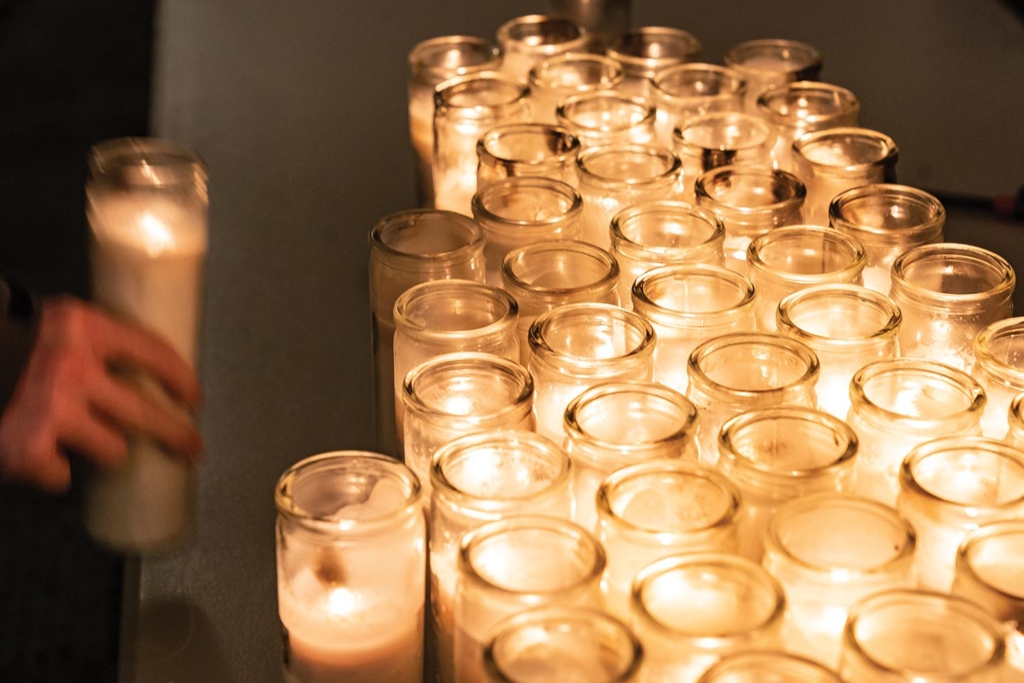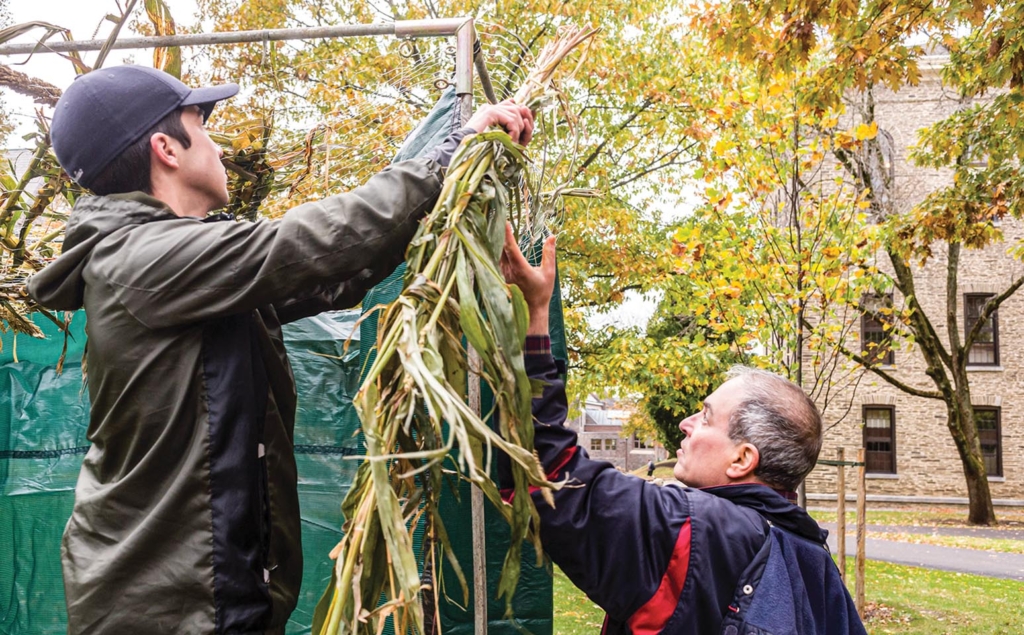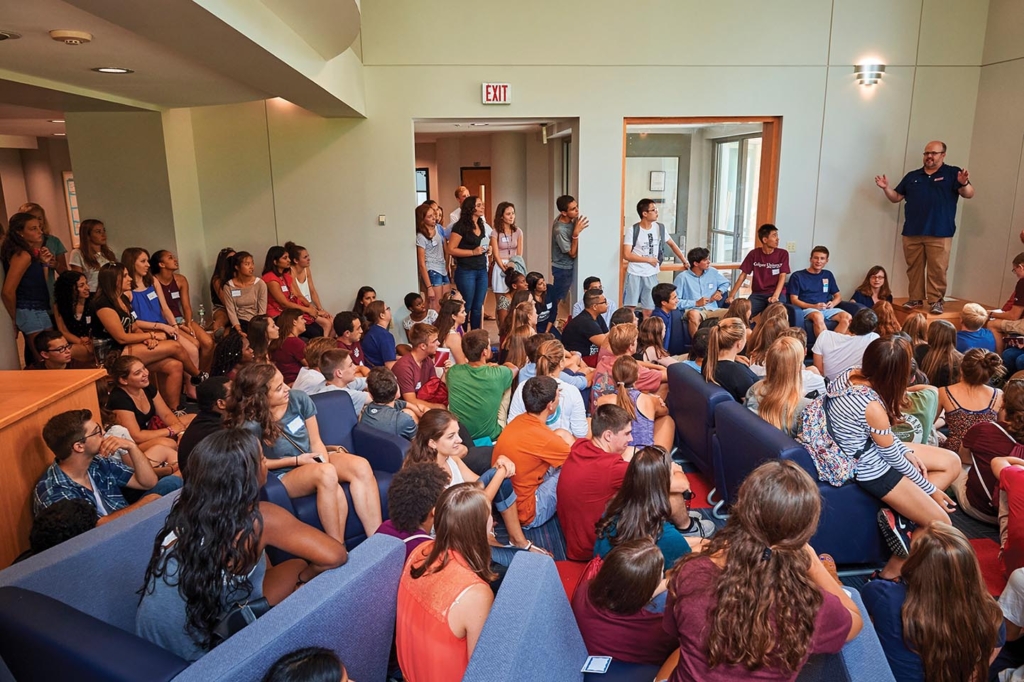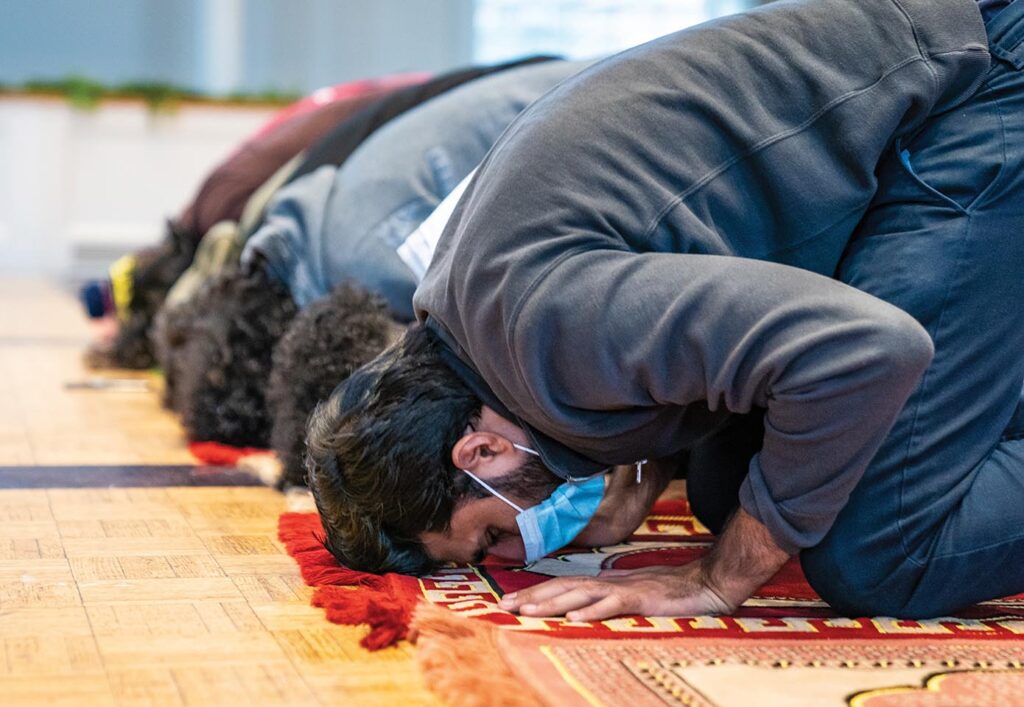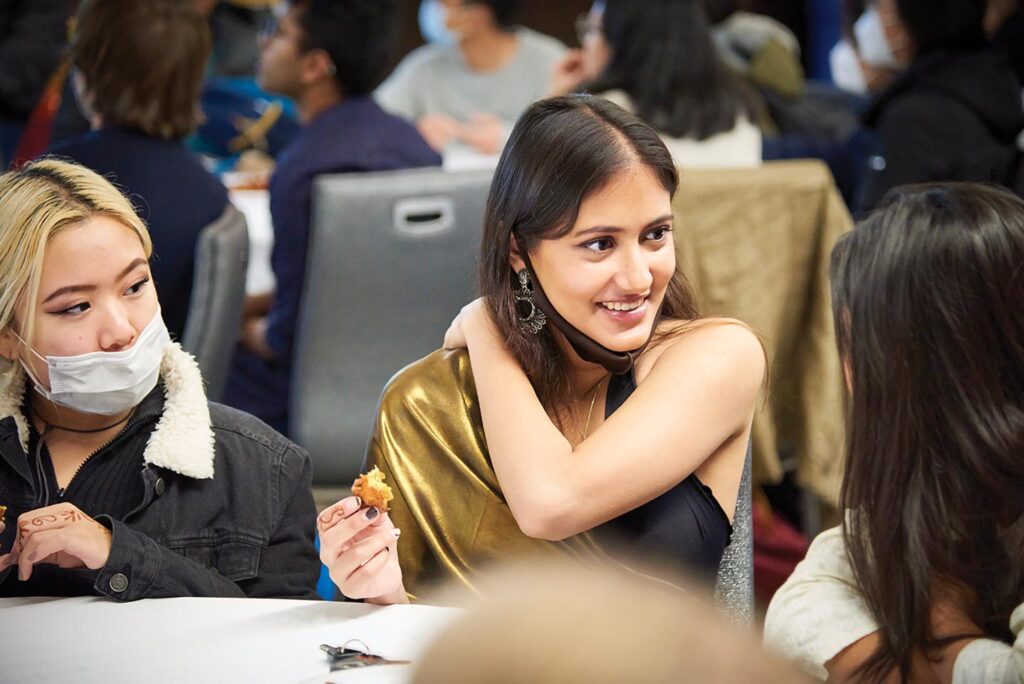Building an interfaith community and acceptance through Colgate’s religious life initiatives
Act I
Every Friday at noon, in the center of campus, a holy experience takes place.
Standing on the Colgate Memorial Chapel stage, Ahmet Çelik, the University’s first campus imam, delivers a sermon to a small group of students. Then, with their prayer rugs arranged in a neat row, they pray.
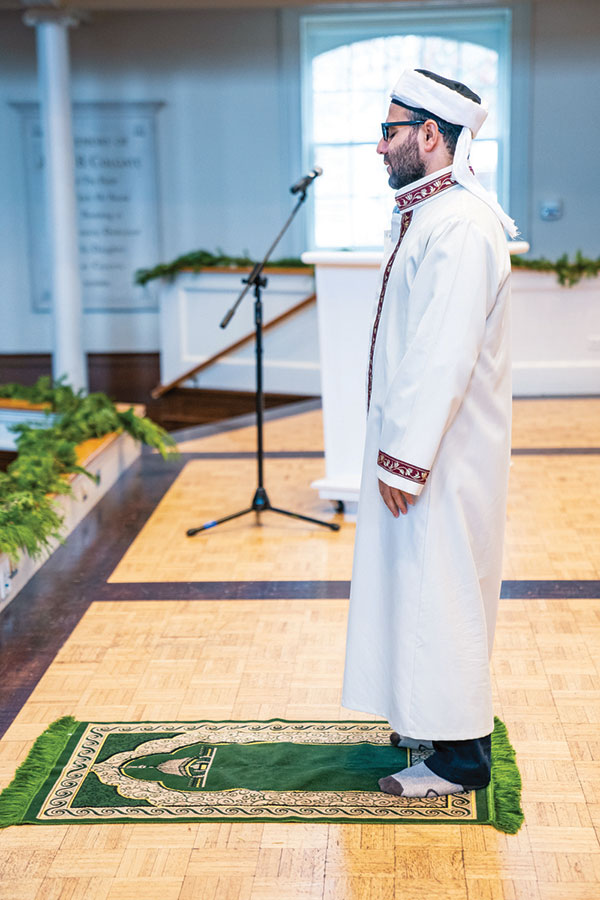
They’re participating in Jummah, the midday prayer service practiced in Islam. While the event is organized by Çelik and the Muslim Student Association, the entire campus community is welcome.
At Colgate, there’s great interest in preserving the interfaith community that’s been built within those chapel walls. One of the most recent displays of that commitment is the hiring of Çelik, a direct result of efforts to find concrete ways to support Muslim students, faculty, and staff. Associate University Chaplain and Protestant Campus Minister Rev. Corey MacPherson, who came to Colgate seven years ago and previously served as the Muslim student adviser, says the hiring of a campus imam has been a long-term initiative for Colgate’s Office of the Chaplains. “It’s made such a huge difference in the energy and the the number of Muslim students [who] come to Jummah,” MacPherson notes. Additionally, in recent years, the chaplains have organized a Muslim prayer room and a foot-washing station that can be used before praying.
For Çelik, who started the part-time role last summer, the best part of the job is interacting with students who need a religious mentor. “[It’s] very nice for me to respond to their demand, their need,” he says. “They are happy with having a Muslim chaplain who can lead them in any religious issues they have, or who can just meet with them and listen to them.”
The hiring of Çelik demonstrates Colgate’s willingness to change with the growing student population. With the rising number of Hindu students on campus (and an incoming class with the highest number in Colgate history), MacPherson says, there’s potential for a future Hindu chaplain. Even if there aren’t enough students to warrant a religious leader’s permanent presence on campus, the chaplains work to provide access to religious services in the wider community. “Even if we only have a few Sikh students (right now we have four), we’re going to help provide transportation,” he says.
Act II
Having a constant place of religious support is important for students on campus, especially new ones, says MacPherson. “Students this age are deconstructing their religious understanding and their faith.” It’s a time when they’re processing what they grew up learning and believing, and they often come to the question, “Will I make this faith my own?”
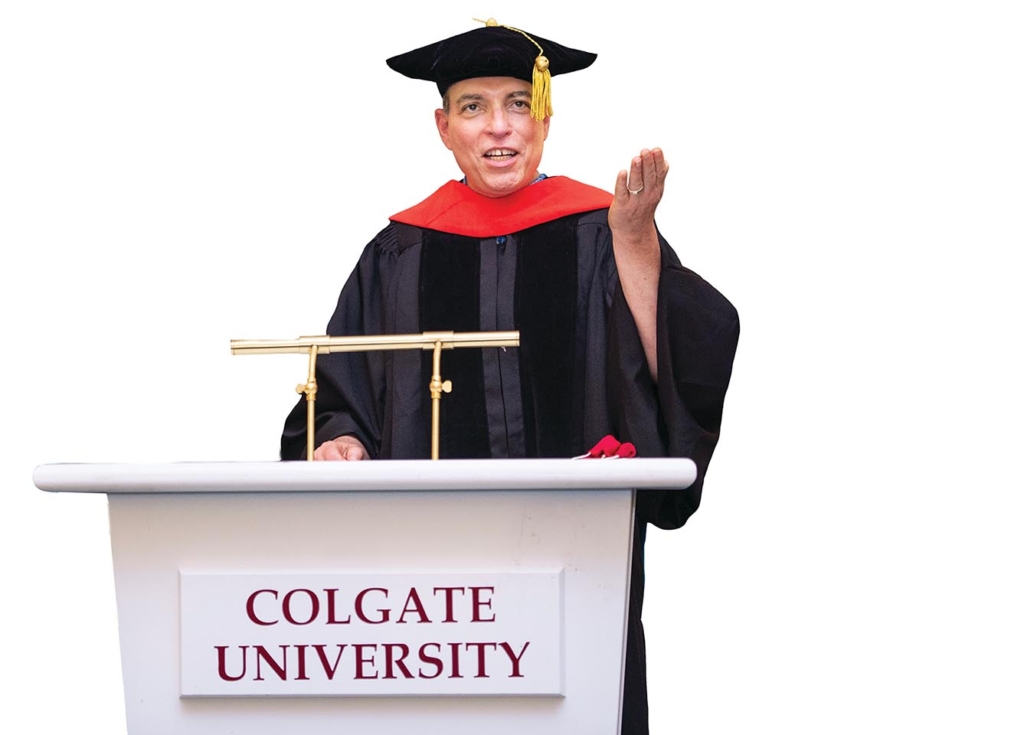
That’s where the chaplains come in. Today, “religious life at Colgate is defined as an integral part of that experience for those people who want it to be,” says University Chaplain and Campus Rabbi Barry Baron. The goal of the four chaplains is to create a consistently welcoming environment for students, complete with thought-provoking programming and a wealth of support. Helping students respect and learn about other religions within the greater Colgate community is a part of that mission. “If you think about a theme of interfaith cooperation, that’s about everybody finding what’s good in each other and getting along,” Baron says.
At Colgate, religious events are open to everyone, and students are encouraged to seek knowledge about faiths other than their own. That openness and commitment to interfaith cooperation is what, in part, brought Giselle Wong ’23 and Corinna Yee ’23, two close friends, together as first-years. The pair initially met through University Orchestra, but religion naturally came up in their conversations over time. Both women are devoted to their individual faiths, but services together quickly became a habit.
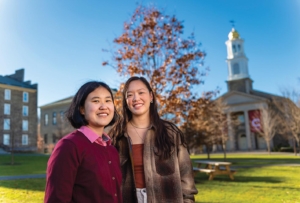
A Jewish student, Yee goes to University Church every week because Wong is a leader in the Colgate Christian Fellowship. Wong goes to Shabbat dinner with Yee every Friday. “I enjoy going, and I enjoy the people, and I’ve become really close friends with people through that,” says Wong. With limited in-person extracurricular activities due to the pandemic, Yee and Wong found religious services to be a cornerstone of their social lives during the past couple of years. Going to religious events together allowed them to spend more time together, and to double up on those in-person events. “It was an interesting experience the first few times, but then it just became a routine, and now that’s what we do,” says Wong.
Learning more about one another, and accepting their similarities as well as their differences, has allowed Yee and Wong to foster a growing friendship. Besides offering a place to build community, attending events from faiths other than their own has allowed the women to consider other lines of thought. “It’s an opportunity to learn from other perspectives, and there’s a lot that doesn’t just have to do with religion and God,” says Yee. “Whenever I listen to Corey’s [MacPherson] sermons, I’m not necessarily thinking ‘this is a Christian perspective.’ I’m thinking about how I can approach my life and make myself a better person.”
Act III
Twenty years earlier, friends Rachel Hackenberg ’98 and Heather McClendon ’97 Sinclair had a similar experience to Yee and Wong. When they arrived on campus, both from Protestant Christian backgrounds, they knew they’d take part in religious life. What they didn’t know is that they’d take part in activities and events for religions other than their own. “I was this wide-eyed, innocent country girl with long hair and calico dresses, and church was part of my life,” remembers Hackenberg. “And where I came from in central Pennsylvania, different meant Catholic.” They were introduced to other religions during their time at Colgate through conversations with other students in the chapel basement and attendance at events like the annual Passover seder. “I remember the always open invitation,” says Sinclair, now a United Methodist pastor in Westport, Conn. Hackenberg, now managing editor at the Christian publisher The Pilgrim Press, remembers that, in her era, interfaith activities were mainly Christian-Jewish.
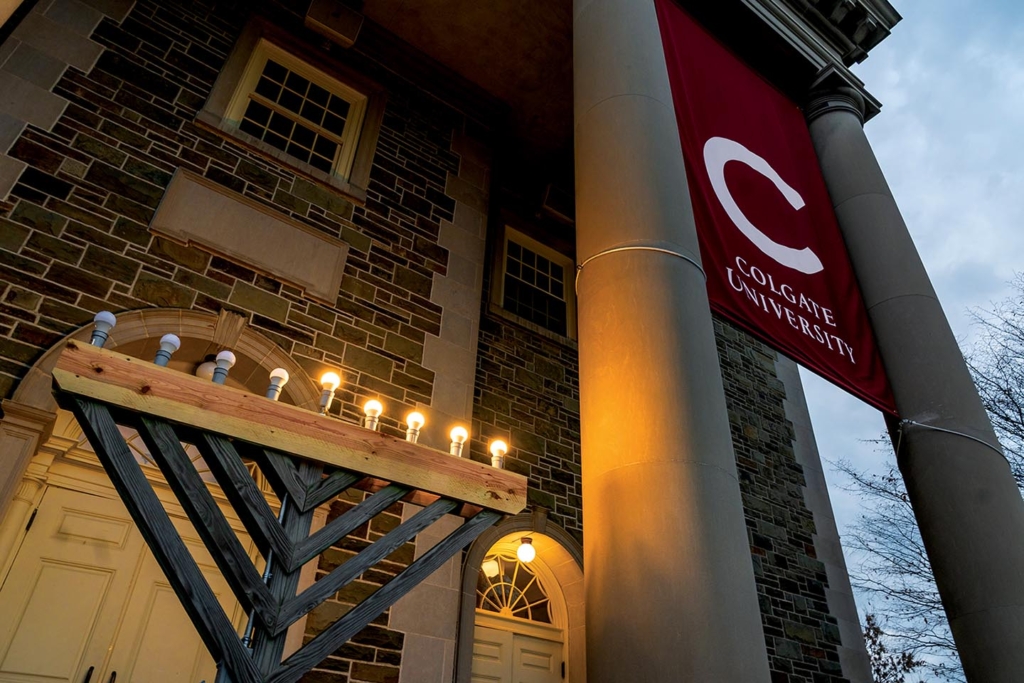
Those initiatives were shepherded by then–Protestant University Chaplain Rev. Nancy A. DeVries, whom Hackenberg and Sinclair witnessed creating space for religions other than Christianity in the chapel. For example, DeVries made sure Muslim students always had a prayer space available.
Rodney Mason ’06, who was raised in a Syracuse African American Baptist church, has similar memories of DeVries: “[She was] very welcoming and accepting of people of different races and nationalities; she wanted to create an open and comfortable community and space for Colgate students.”
Chaplains furthering diversity has been a decades-long tradition on campus. In 1991, the luminary Coleman Brown, who served Colgate in several capacities — including University Chaplain — for nearly 30 years, addressed a group of prospective students. He told them this: Colgate is “a community increasingly aware that one of our greatest challenges and privileges is learning how to become truly a community in our diversity.” Yes, Jewish students celebrate Rosh Hashanah in the Saperstein Center, and Christians observe candlelight Mass in the chapel, but they also make time to come together.
To facilitate that environment, the chaplains have worked for decades to foster a dedicated religious community on campus. With its central location and obvious sacrality, the chapel has been home to that mission. The basement specifically — long a gathering place for students to do their homework, study, or relax with friends — has created a welcoming environment. “People don’t just hang out in places because they’re pretty or because they’re interesting,” notes Deacon Mark Shiner, associate University chaplain and Catholic campus minister, “they hang out because either something they need is there or something that they love is there.”
Act IV
Though religious diversity and interfaith cooperation have increased on campus in recent decades, they weren’t always at the forefront of the University’s mission.
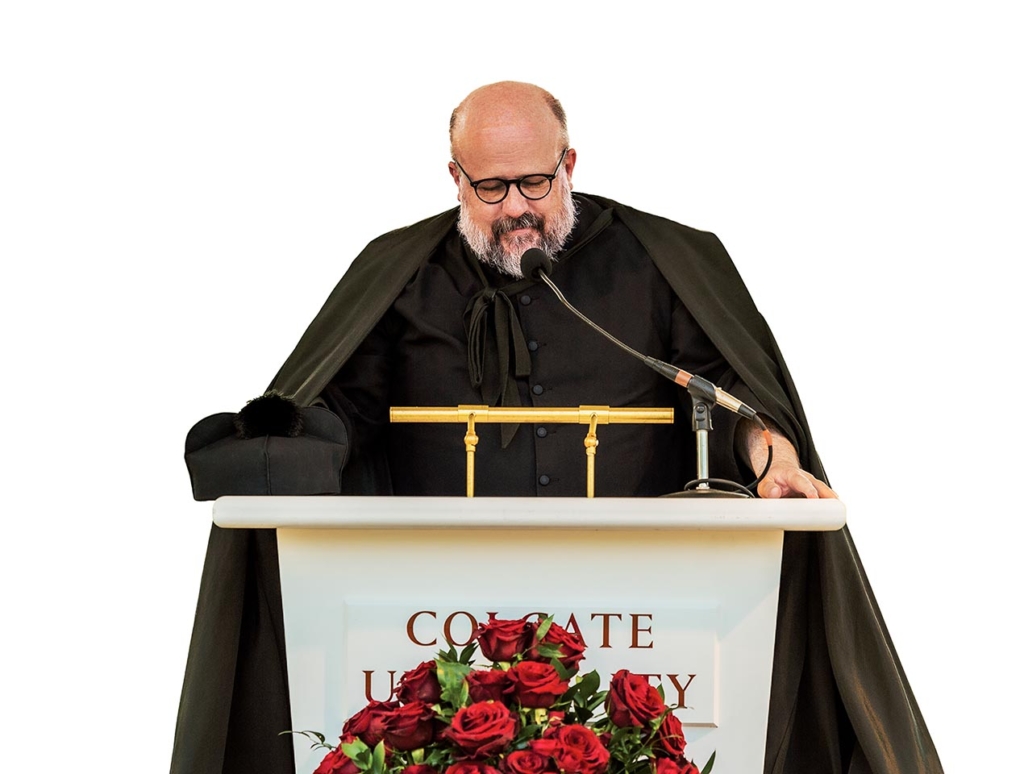
Colgate, which began as a Baptist institution, maintained those allegiances for generations. And, until the recent past, the majority of the student body identified as Baptist. During World War II, the University started inching toward religious diversity when the military training programs on campus increased the range of faiths among students. But, individual communities had to be strengthened before interfaith cooperation could be achieved. Colgate’s first Jewish faculty member, Marvin Wachman, arrived at the University in 1946. That same year, Kenneth Morgan, a Quaker serving as Colgate’s new University chaplain and professor of religion (and who oversaw the construction of Chapel House), saw a student body with more Catholics than Baptists. Colgate’s Newman Club was founded in 1948, creating a community for the Catholic students. Through it all, a few strove to make Colgate a more accepting place for religious ideas.
In 1993, the Saperstein Center opened and a Jewish studies minor was offered to students. In the last 20 years, the Muslim, Hindu, and Buddhist student associations were created.
The chaplains acknowledge that not all students attending Colgate take part in religious life, and it’s often an all-or-nothing part of their experience at the University. Baron estimates that religious life touches only about half of Colgate’s student body. Still, “the first commitment is to help Catholics be better Catholics, Jews be better Jews, Muslims be better Muslims,” says Shiner. “We want them to feel like college was a time of growth for them spiritually.
“We’re not trying to make everything into an interfaith soup,” he continues. “[We’re] trying to make it something more like a fruit salad, where you have these distinct and recognizable things and they belong there and that’s good.” Baron adds: “It’s important to view Colgate itself as a community and all of these [religious affiliations] are subcommunities. Then, how does all that work together?”
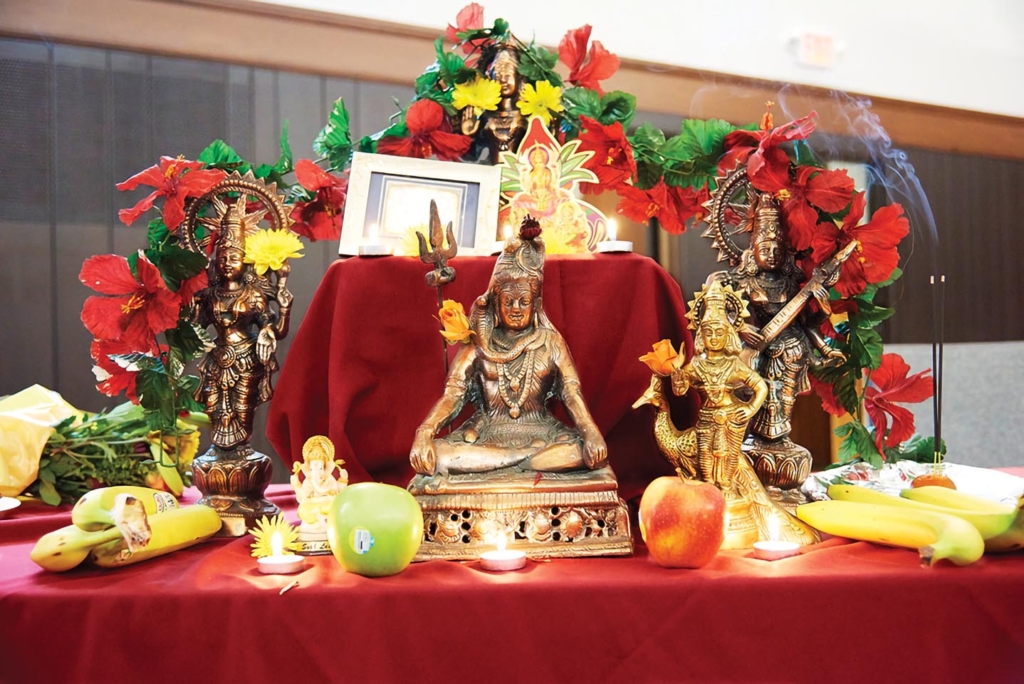
MacPherson acknowledges that there’s still work to be done in regard to strengthening individual religious communities on campus. When a student shared recently that he wished there was a Black church in the community or more Black Christian leaders on campus, MacPherson let him know that he could connect him with Black Christian faculty and staff, and that University Church continues to invite Black speakers to lead Sunday services. Some of those guests included the popular Christian hip-hop artist Lecrae and Amena Brown, a spoken word poet. In addition, Deion Patterson, the worship leader at University Church, who is also the director of the Sojourners Gospel Choir, is the first person of color to be hired by the University to hold these leadership positions.
With a desire for a kosher kitchen evident, the chaplains organized one in the Interfaith House at 110 Broad Street, complete with kosher-friendly utensils and new appliances. “The kosher kitchen is probably just step one,” MacPherson told the Maroon-News last year. “Our rabbi is currently working with Chartwells to have a set area for kosher food.”
For those looking to discuss nontraditional religious perspectives, in 2007, Shiner (along with then-chaplains Mark Mann and Dave Levy) started what’s now known as the Heretics Club, a lunch series created to include students with less mainstream religious ideologies, like agnostics and freethinkers. Over the years, it’s evolved into a place where niche ideas can be expressed. For example, in 2020, Jailekha Zutshi ’21 led a presentation called “Decolonizing Religion: Intersectional Approaches to Understanding Anti-Blackness and Casteism in South Asia.”
The draw to open, welcoming religious-centered events like these, in the chapel sanctuary or basement, the Sap, or simply a classroom, is clear, says Shiner. Students want to find community. They want relationships where they can walk into a room, and someone says to them, “Hey, I’m happy that you’re here. It’s so good to see you today.” Shiner adds: “I just think that’s one of the most human things in the world.”
Continuing Acts
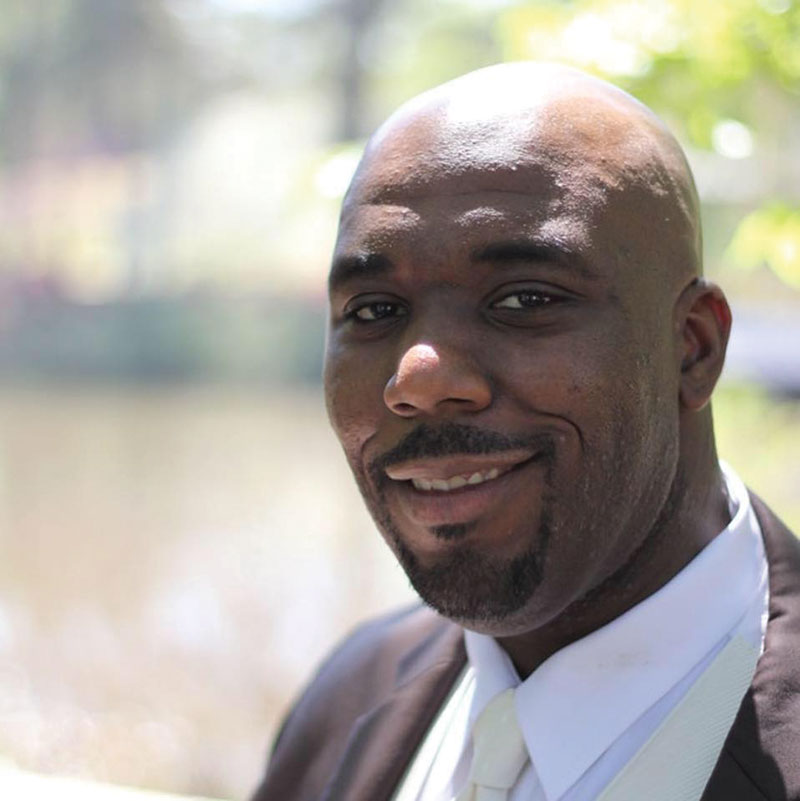
For some alumni, experiences in Colgate religious life inspired religion-focused careers.
When Rodney Mason ’06 arrived on campus for the Office of Undergraduate Studies program the summer before his first year, his post-grad plans involved medical school to specialize in OB-GYN. But, over the course of the next three years, he’d change his major to Africana studies and religion. The shift was thanks to Professor Harvey Sindima’s influence and mentorship (including requiring Mason to take 342: A History of Christian Thought as a first-year) and then–Protestant University Chaplain Rev. Nancy A. DeVries’ careful guidance. “[Professor Sindima] really helped me connect what I was learning in the classroom with how I would put it in practice in the church,” Mason says.
He’s now a preacher at Berean Christian Church in Stone Mountain, Ga., leading his congregation with this guiding principle: to make sure that what happens Monday through Saturday, when his community isn’t in the church pews, is meaningful. To help achieve this, he’s turned back to education, starting a college bridge program in DeKalb County; his mentees have gone on to attend Harvard, Yale, Tufts, Morehouse, Belmont, UCLA, and, yes, Colgate.
As a student, seeing DeVries advise the Hindu and Muslim student associations, creating dialogues across religious groups, was eye-opening for him. Keeping that in mind, while earning his master of divinity at Emory University, Mason ran a theology camp for high school students. It was a watershed moment for him, to be able to lead students of a range of faiths, races, nationalities, and traditions, just as DeVries had. He’s still in contact with most of them today. “I was able to have that impact because of the experience I had at [the] Colgate chapel by being able to connect with people from different faith levels,” he says.

